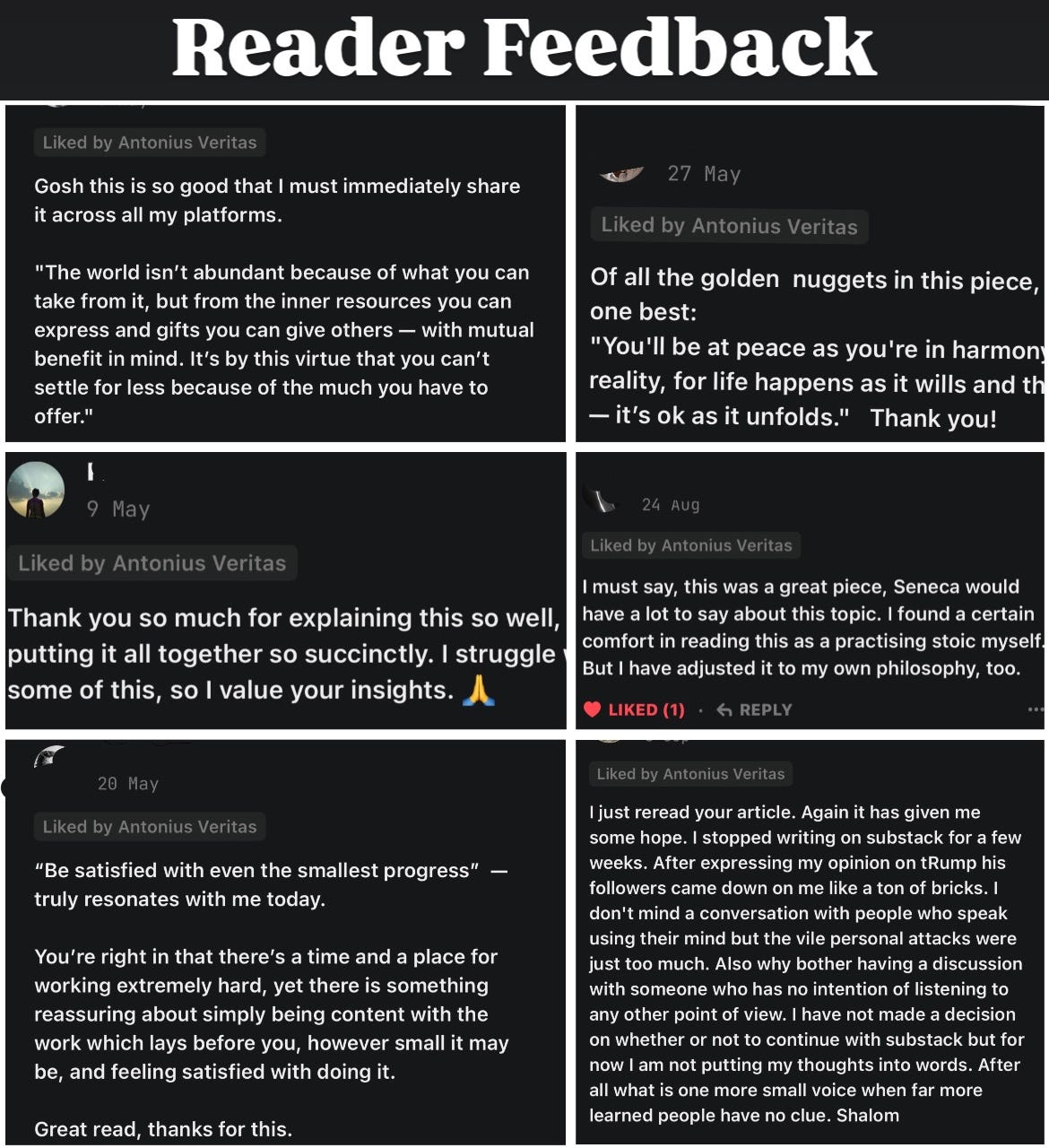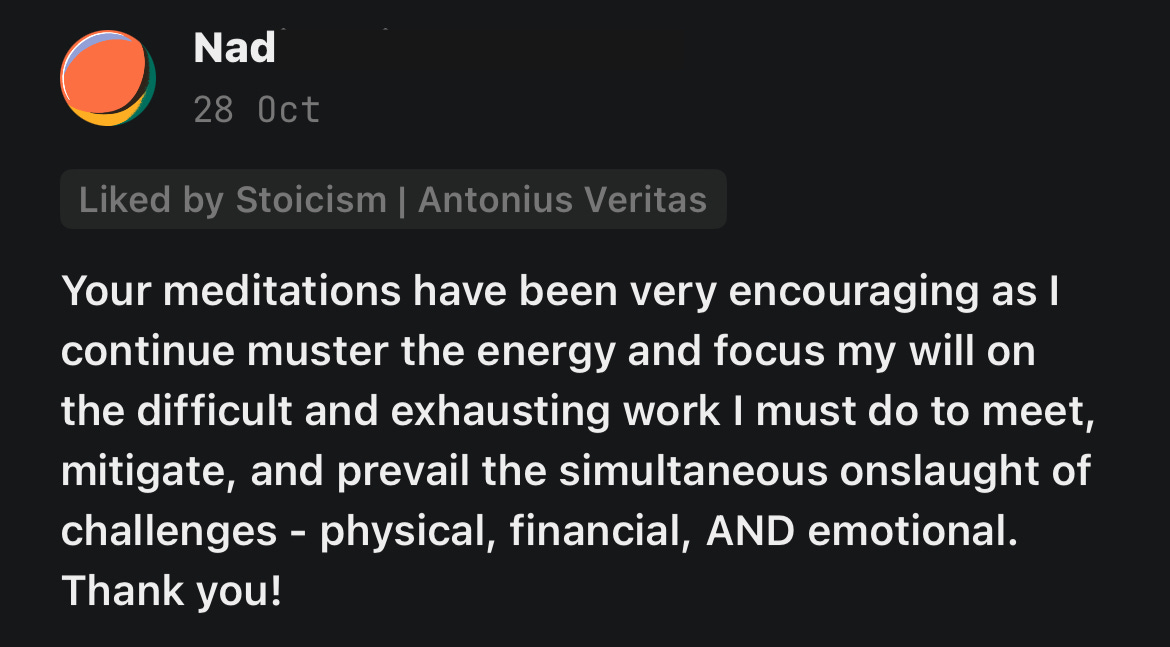LI. Concentrate Like a Roman
We rise, pouring all that we are into the work and people in front of us.
The ‘Neuroscience-based Tools’ section is a companion for The Stoic Manual to help you become wealthier, happier & more powerful by boosting your resilience, drive, mood, motivation, relationships, focus, and overall health—by Dr. Antonius Veritas.
“Concentrate every minute like a Roman—like a man—on doing what's in front of you with precise and genuine seriousness, tenderly, willingly, with justice.”
The following short story is known as The Hare and the Bees. It goes like this…
A boastful hare mocked a hive of bees. "I can gather more flowers in an hour than you can in a day!"
The bees challenged him. By sunset, they would see who could produce the most.
The hare raced through the meadow, piling up petals and leaves, while the bees worked steadily, gathering nectar from each bloom.
When the day ended, the hare showed off his mountain of flowers. "And where is your prize?" he sneered.
The bees unveiled a comb of golden honey. "You scattered your effort," said the queen. "We focused ours."
P.S: Scroll to the end for a practical guide on how to concentrate like a Roman.
There’s a discipline to living fully—a quiet, deliberate act of defiance against fear, laziness, and the smallness that seeks to shrink our lives.
This occurs when we face life as it comes, with steady hands and unshaken hearts.
The size of our tasks doesn’t matter—what does is our willingness to begin.
To hesitate, to waver, is to give fear and laziness dominion over us.
But we’re not ruled by such petty forces.
We rise, pouring all that we are into the work and people in front of us.
We rebel against wasting our energy on doubt, distractions, or complains.
This is no small feat.
It requires training the mind to release its grasp on what lies beyond our control.
Even death becomes the nagging friend that pressures us to make the most of each moment. It isn’t a punishment, nor a tragedy—it’s simply the way of things.
“This, then, is consistent with the character of a reflecting man, to be neither careless nor impatient nor contemptuous with respect to death, but to wait for it as one of the operations of nature.
As you now wait for the time when the child shall come out of your wife’s womb, so be ready for the time when your soul shall fall out of this envelope.” —Marcus Aurelius
And in accepting this, we free ourselves to live fully, to create boldly, to greedily love and care for the people who matter to us.
Intensity is our discipline.
We attend to each moment with care and precision, giving it our full attention like it’s the last slice of pizza at a party.
The future doesn’t concern us, nor does the illusion of safety.
We trust instead in the order of the world, that all things—pleasant or painful—conspire for the good.
We trust ourselves—our rational powers, our character, and our philosophy to help us endure and thrive no matter what.
Challenges arise, as they must, but they are the path itself.
Every difficulty is a chance to uncover the untapped reserves of strength and grace within us.
To express our love, goodwill, and strategic aptitude, which in turn heal us.
“Dig inside yourself.
Inside there is a spring of goodness ready to gush at any moment if you keep digging.” — Marcus Aurelius
Yet, while we’re out there tackling the big stuff, we don’t forget the little joys of connecting with other people.
We have real conversations. Not the ones where we nod politely while wondering if we unplugged the iron.
We stop overthinking every interaction and just talk—laugh, listen, and maybe even learn something.
We can see interactions as a chance to practice our social skills, deduce body language, practice witticisms, and learn what works to influence people. These are invaluable skills.
People are quirky, fascinating, and occasionally annoying, but that’s what makes them worth knowing.
Love is central to this way of being.
We radically embrace and seek discomfort, knowing it’s part of the deal.
Pain is our mentor, teaching us courage and confidence.
Failure is a stepping stone, making us more creative, refined, and resilient to adapt and move forward.
Fear, doubt, and insecurities, those pesky little demons, are like bad roommates—they’ll never move out entirely, but you can make them pull their weight.
Fear? It shows you what you must do.
Doubt? It keeps you sharp, clarifies what you control, and fortifies your commitment.
Insecurities? They teach you humor.
We have no time to complain about what happens—it’s all been given to us for a reason, and we will make use of it.
Risk becomes a habit.
We walk toward the things that scare us but hold the promise of growth.
We stretch beyond the boundaries of comfort, knowing that this is where life expands.
Friendship deepens us. Laughter renews us.
And through it all, we anchor ourselves in the eternal present, where the world is as it should be—not as we imagine it in our minds.
We do not fear life’s recurring themes.
They are the timelessness we talked about—tests we’ve faced before and will face again.
The difference is that now, we meet them with the quiet knowledge that we are indomitable. We meet them with virtue.
Nothing external can harm what lies at our core—our soul, consciousness, or whatever you want to call it.
Every situation is raw material, waiting to be shaped into something greater, more beautiful, and long-lasting.
Practical Guide: 9 Steps to Concentrate like a Roman
1. Dominate Your Day Through Intentional Focus
Set Boundaries Around Your Work: Identify the three strategic tasks that matter most in the long term and commit to completing them early in the morning before allowing distractions (e.g., social media & emails) to creep in.
Do you like this meditation so far? ⭐️
Support the publication to read the rest and access 100+ premium essays & meditations.
Here’s what other readers are saying…




